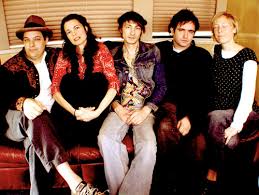
Donna The Buffalo / Lion’s Den/ Jan. 18, 2004
Upper New York sextet Donna The Buffalo navigated through an expansive range of roots-y Americana at this narrow, crowded, friendly West Village pub. Much like seasoned jam bands Phish and the Grateful Dead (but with a more pronounced Country & Western bent), they ask for no quarter delivering an exhaustive two and a half hour set.
But while several songs stretched well into the seven-minute mark, they never meandered into excessive, long-winded solo excursions. Instead, the tight, democratic ensemble benefited from an intuitive approach, stretching out over wide-open spaces within each penetrating arrangement, but never once becoming unhinged. Though their fine, recent full length, Positive Friction, represents the band well, Donna The Buffalo’s whimsical spontaneity and natural rural inclinations shine brightest in a live setting.
Loose multi-harmonies and the firm rhythmic foundation of bassist Jeb Greenberg and drummer Tom Gilbert secure many of their jams. And the murky, slightly undersized sound system of the Lion’s Den added rustic authenticity to Donna The Buffalo’s Dust Bowl-styled folk-blues, misty mountain hops, sedate heartland meditations, and one neat skiffle shuffle. Dixie-fried standard, “Bravest Cowboy,” became a beat-driven prairie-bound showdown in their hands.
Singer/ accordionist/ rubboard player Tara Nevins fiddled on a few two-step boogies, back porch country bops, a positive-minded bass-thumped reggae calypso, and a party-spirited Cajun-clipped honky tonk ditty. Ritchie Stearns’ organ and synthesizer drenched a kitschy ska-tinged number and otherwise provided backup for Jeb Puryear and Jim Miller’s clanging guitar chatter. After closing with the “Bo Diddley” beat-stricken “Learning Curve,” the dancing and swaying audience begged for an encore of the bands’ concert staple, “In Another World.” Then, the generous musicians tagged on a few more selections for great measure. Anyone ready to experience a red hot hootenanny should attend a Donna The Buffalo shindig ASAP.